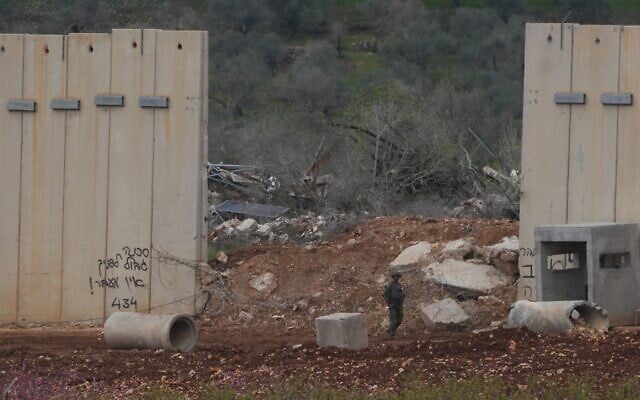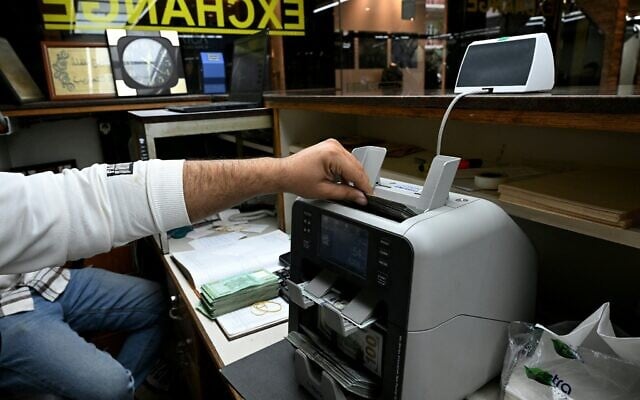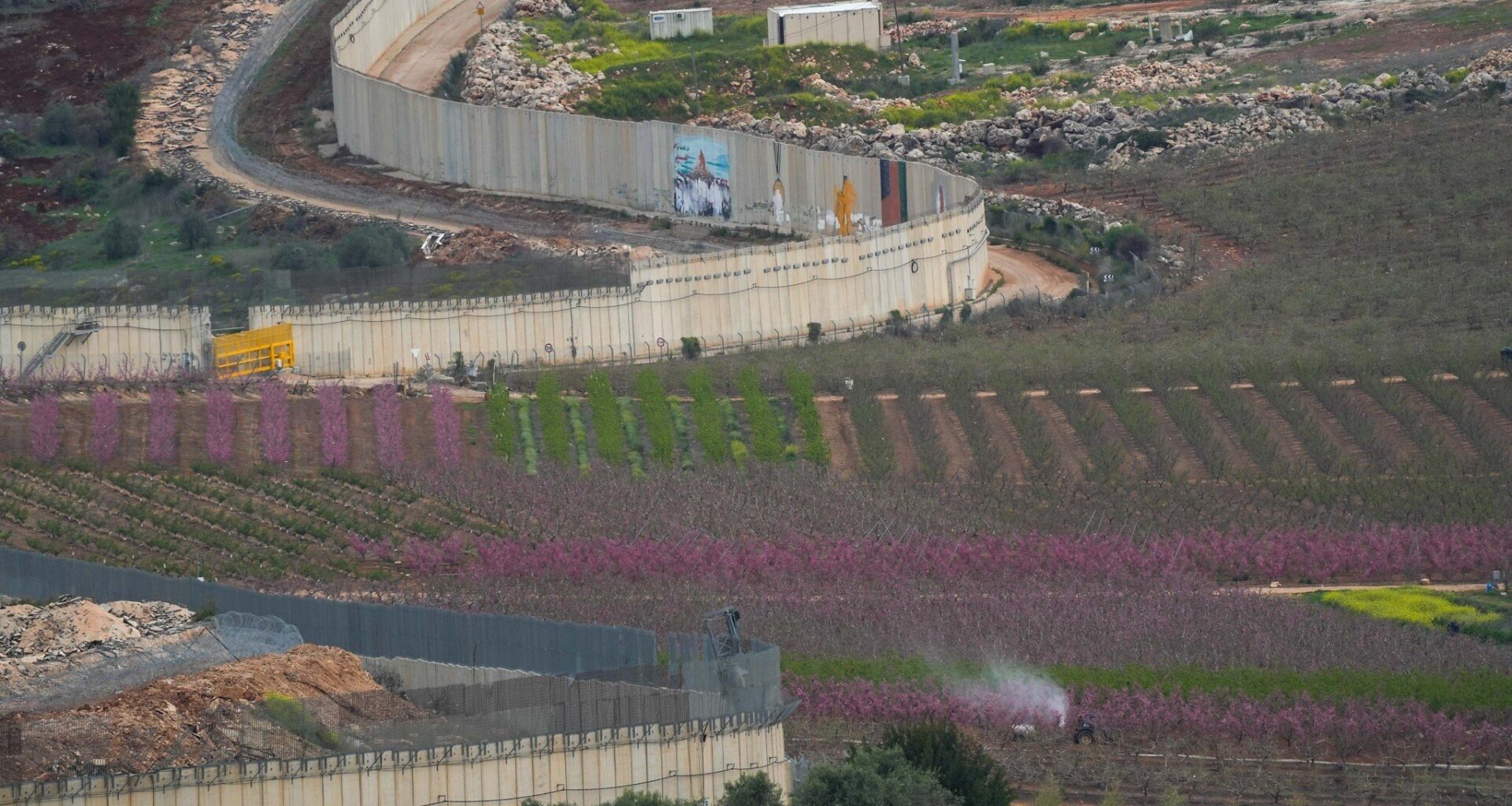The United Nations Interim Force in Lebanon said Friday that sections of a border wall Israel is constructing on the Lebanese frontier cross the UN-recognized Blue Line, calling the construction a violation of Lebanon’s sovereignty.
Work on a border wall to replace Israel’s aging fence with Lebanon began in 2018 but has progressed slowly.
The accusation by UNIFIL came as Israel continues near-daily strikes against Hezbollah terror group operatives in southern Lebanon, amid US and Israeli pressure on Beirut to cut off the terror group’s funding and confiscate its arms.
According to UNIFIL, in October, its observers “conducted a geospatial survey of a concrete T-wall erected by the Israel Defense Forces southwest of Yaroun,” which confirmed that the wall “crossed the Blue Line, rendering more than 4,000 square meters of Lebanese territory inaccessible to the Lebanese people.”
UNIFIL said it informed the IDF of the findings and requested that it move the wall.
Get The Times of Israel’s Daily Edition
by email and never miss our top stories
By signing up, you agree to the terms
This month, UNIFIL said its observers “observed additional T-wall construction in the area,” reporting: “A survey confirmed that a section of wall southeast of Yaroun also crossed the Blue Line. We will formally inform the IDF of our findings here as well.”
UNIFIL said that “Israeli presence and construction in Lebanese territory are violations of Security Council resolution 1701 and of Lebanon’s sovereignty and territorial integrity.”
In early 2023, the IDF ramped up construction of the wall, which then halted with the start of the war on October 7, 2023, with the Hezbollah terror group launching attacks on Israel. Since the November 2024 ceasefire, work has resumed on the border wall, along with the construction of dozens of new army posts on the Israeli side of the border.

Israeli soldiers guard along the border wall with Lebanon, northern Israel, March 22, 2025. (Ayal Margolin/Flash90)
“We again call on the IDF to respect the Blue Line in its full length and withdraw from all areas north of it,” it said, as the military still maintains five positions inside southern Lebanon following the November 2024 ceasefire that ended fighting with Hezbollah.
UNIFIL added that a new wall that is being constructed between Aitaroun and Maroun al-Ras is on the Israeli side of the Blue Line.
IDF strikes Hezbollah weapons depot
The UNIFIL accusation came a day after Israel struck a Hezbollah weapons depot and adjacent underground site in southern Lebanon, the latest in near-daily Israeli airstrikes against Hezbollah targets in the region, with Israel accusing the Iran-backed terror group of seeking to re-establish itself in violation of the ceasefire deal.
The infrastructure was located next to a public sports and leisure center, “serving as yet another example of Hezbollah’s cynical use of Lebanese civilians as human shields for its operations conducted from within civilian areas,” the military said.
Another Hezbollah site in southern Lebanon was also targeted in an airstrike Thursday morning, the IDF added.
The military said Hezbollah is continuing its efforts to restore its infrastructure in Lebanon, and the presence of such sites and the terror group’s activity in the area “constitute a violation of the understandings between Israel and Lebanon.”
מוקדם יותר הבוקר, חיל-האוויר תקף, מחסן אמצעי לחימה ותשתית טרור תת קרקעית אשר שימשו את חיזבאללה במרחב דרום לבנון.
תשתיות הטרור שהותקפו מוקמו בסמוך לאוכלוסיה אזרחית, ומהוות דוגמה נוספת לשימוש הציני שעושה חיזבאללה באזרחי לבנון כמגן אנושי לפעולות הארגון מתוך נכסים אזרחים>>> pic.twitter.com/IRbTKVgpNt
— Israeli Air Force (@IAFsite) November 13, 2025
Lebanese media also reported a separate Israeli airstrike on a car in the southern Lebanese town of Toul. The IDF said that the explosion was not the result of a strike, but rather an accident during a Hezbollah attempt to smuggle weapons.
Hezbollah was greatly weakened in its most recent war with Israel, which started when the terror group began firing missiles at the Jewish state on October 8, 2023, a day after the Hamas terror group launched its own attack on Israel from Gaza, triggering the war in the Strip.
After nearly a year of daily skirmishes, Israel launched massive airstrikes and a limited ground incursion into southern Lebanon in September 2024. A ceasefire was declared two months later, with Hezbollah left severely weakened. The agreement allows Israel to strike imminent threats.
Beirut cracks down on moneychangers
On Friday, Lebanon announced that moneychangers and transfer companies must comply with stricter rules.
The move came days after a visiting US official said his country was determined to cut off Tehran’s funding to Hezbollah, and after the US Treasury said Iran’s Revolutionary Guards had transferred over $1 billion to the terror group this year, mainly via money exchange companies.
As part of efforts “to remove Lebanon from the Financial Action Task Force (FATF) grey list… the central bank of Lebanon today has taken the first step in a series of precautionary measures aiming to strengthen the compliance environment within the financial sector,” a central bank statement said.

A teller counts money at an exchange office in Beirut, Lebanon, on November 14, 2025. (Joseph EID / AFP)
The FATF in October last year added Lebanon to its “grey list” of nations that are subject to increased monitoring of financial transactions.
The central bank said it was imposing measures “on all non-bank financial institutions licensed by the central bank of Lebanon, including money transfer companies, exchange bureaus,” and other firms handling foreign currency transactions and transfers to and from the country.
According to a central bank circular from December 1, all non-bank financial institutions must “collect information and data linked to their customers and operations” for transactions of $1,000 or more and report them to the central bank.
Institutions must confirm they have collected the required information before carrying out any transaction, the circular added.
The measures are consistent “with international standards on fighting money laundering and terrorist financing, and preventing the misuse of the authorized financial system for suspicious transactions,” it said.
Israel says Hezbollah murdered Christian politician
Amid the disarming and defunding efforts, Israel said Friday that a Lebanese politician who died in August 2023 was not the victim of a car accident, as initially claimed, but rather was murdered by Hezbollah.
Elias al-Hasrouni, 72, was a senior member of the Lebanese Forces, Lebanon’s main Christian party headed by Samir Geagea.
Hasrouni was found dead on August 2, 2023, in Ain Ebel — a Christian-majority town surrounded by Shiite villages with strong Hezbollah presence in southern Lebanon — with Lebanese media first reporting it to have been a car crash.
Days later, local authorities and Hasrouni’s party claimed he had been kidnapped by several individuals and beaten to death.
#خاص ???? جيش الدفاع يكشف عن وحدة الاغتيالات التابعة لحزب الله التي اغتالت السياسي المسيحي إلياس الحصروني
????يؤكد جيش الدفاع ما تم تداوله بشأن اغتيال أمين عام حزب القوات اللبنانية في بنت جبيل، إلياس الحصروني على يد الوحدة 121 التابعة لحزب الله الارهابي، وذلك خلافًا للشائعات التي… pic.twitter.com/eXr1ym2WKk
— افيخاي ادرعي (@AvichayAdraee) November 14, 2025
In a post on X on Friday, Col. Avichay Adraee, the IDF’s Arabic-language spokesman, said Hasrouni, who was “known for his strongly anti-Hezbollah stance,” was murdered by the terror group’s special operations unit.
“On the night of August 1, 2023, members of Unit 121 ambushed Hasrouni on a road near his home in Ain Ebel in southern Lebanon, where they kidnapped him and killed him by poisoning and breaking his ribs. Afterwards, to create the impression that he’d veered off the road and died in a car accident, they returned his body to his car, which they crashed into a tree, and left him inside it in a roadside ditch,” Adraee said.
According to Adraee, Unit 121, Hezbollah’s surveillance and special operations unit, “carries out assassinations targeting journalists, officers, politicians and other figures in Lebanon who oppose Hezbollah and its activities.”
“This unit serves as the organization’s internal security arm, which it uses to track and eliminate its opponents,” he said, noting that among the unit’s victims was former Lebanese prime minister Rafik Hariri.
“Despite the heavy blow Hezbollah suffered during the war, it continues to try to sow chaos in Lebanon and rebuild its strength by using Unit 121 and other tools. The Lebanese people, who yearn for stability and prosperity, fully understand the need to eliminate this decaying Iranian arm that has dragged the country into futile wars, spies on the population, and assassinates its opponents,” Adraee added.

